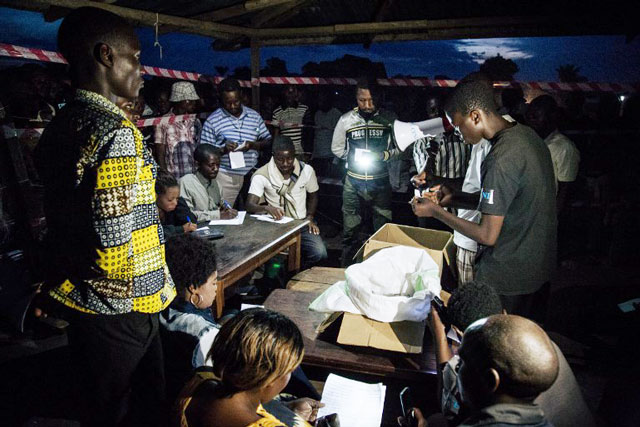
Kinshasa, DR Congo | AFP | Provisional results of the much-delayed Democratic Republic of Congo’s presidential election could be counted in “24 to 48 hours,” a top electoral official said on Tuesday.
The elections, postponed three times over the last two years, were to choose a successor to long-term President Joseph Kabila but early results from the December 30 election, due last Sunday, have been pushed back.
The Independent National Electoral Commission (CENI) blamed problems collecting the data but tensions have increased as international pressure mounts to publish the outcome in a country where past elections were marred by violence.
“It is a huge task that we can’t finish in just a few hours,” CENI President Corneille Nangaa told AFP, as the commission held a plenary session of final deliberations.
“The CENI plans to devote 24 to 48 hours to this task, after which time the CENI will schedule the announcement of the provisional results.”
An AFP photographer said armed police were blocking the boulevard in front of the CENI headquarters late on Tuesday.
Kabila was due to step down two years ago, but clung on to office, sparking widespread protests which were brutally repressed, killing dozens in a country that has been a battleground for two wars over the last two decades.
With international concerns growing over the peaceful transfer of power in sub-Saharan Africa’s largest nation, Western powers have upped the pressure.
Opposition presidential candidate Martin Fayulu earlier on Tuesday warned electoral authorities not to “disguise the truth of the polls.”
In one of his first statements since the vote, Fayulu urged the authorities to publish who had won.
“The Congolese people already know the result,” he said, warning against political tensions.
– ‘Results not negotiable’ –
Fayulu’s statement came as the main opposition party UDPS claimed on Tuesday that its candidate Felix Tshisekedi had won and that a meeting with Kabila was being prepared.
“The two figures have an interest in meeting to prepare a peaceful and civilised transfer of power,” said UDPS secretary general Jean-Marc Kabund.
Talk of a possible rapprochement between the UDPS and Kabila was also fuelled after Tshisekedi told Belgian newspaper Le Soir the president could be honoured for his behaviour after stepping down.
“One day we will even have to think of paying tribute to him (Kabila) for agreeing to withdraw,” Tshisekedi said in an interview.
Of the three main contenders for president, Kabila has backed Emmanuel Ramazani Shadary as his preferred successor.
But as the other key opposition candidate, Fayulu in his statement warned the electoral commission “against any attempt to disguise the truth of the polls”.
CENI must “publish the provisional results of the presidential election in the near future,” he said.
According to the initial timetable, after provisional results are released, definite results are due on January 15 with the swearing-in of the new president three days later.
The DRC has a long history of political violence and suspicions of political manipulation and electoral fraud run deep.
It has never experienced a peaceful transition of power since gaining independence from Belgium in 1960.
– ‘Truth and justice’ –
The Protestant Church also added its voice on Tuesday to that of the Catholic Church in urging the authorities to publish the results.
In a statement, the Church of Christ in Congo (ECC) appealed to the election commission to “uphold its promises, made before God and before the nation, to offer the nation the truth, and nothing but the truth, of the ballot box.”
Last Thursday, the powerful Roman Catholic Church said it knew who had won the ballot from its own monitors at polling stations.
The Catholic Church’s National Episcopal Conference of Congo (CENCO) said it had deployed more than 40,000 observers around the vast country.
Catholicism is the main religion in DRC. The ECC, the largest Protestant church, said it had 10,000 election observers on December 30.
The coalition of governing parties, the Common Front for Congo (FCC), has accused CENCO of bias and breaching electoral law. FCC has accused Fayulu of trying to put pressure on the CENI.
Fayulu is backed by former Katanga governor Moise Katumbi, considered a “Judas” by Kabila, and ex-warlord and former vice president Jean-Pierre Bemba.
DR Congo suffered two wars between 1996 and 2003 that claimed millions of lives through bloodshed, fighting, starvation and disease. Bloody clashes also marred elections in 2006 and 2011.
 The Independent Uganda: You get the Truth we Pay the Price
The Independent Uganda: You get the Truth we Pay the Price





